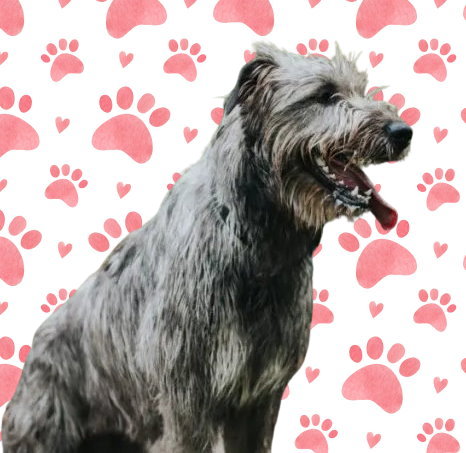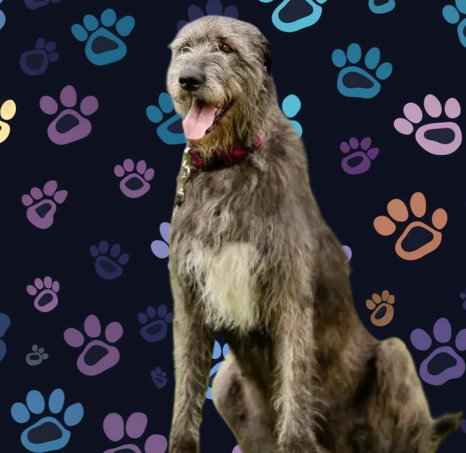Welcome to Dog Training Newbies !
Welcome to Dog Training Newbies !

Irish Wolfhounds are majestic and gentle giants, known for their loyalty and affectionate nature. However, like many dogs, Wolfhounds can also experience separation anxiety, a common behavioral issue that can cause distress for both the dog and their owners. Understanding the causes of separation anxiety in Wolfhounds and implementing effective solutions is essential in helping these sensitive beings cope with being alone.
CAUSES OF SEPARATION ANXIETY IN WOLFHOUNDS
Separation anxiety in Wolfhounds can stem from various factors, including genetics, early life experiences, lack of socialization, changes in routine, or traumatic events. These dogs form strong bonds with their human companions, making them more susceptible to anxiety when left alone.
FACTORS THAT CAN CONTRIBUTE TO SEPARATION ANXIETY IN WOLFHOUNDS INCLUDE:
1. Bonding: Wolfhounds are deeply attached to their families and thrive on human companionship. When separated from their loved ones, they may experience feelings of distress and anxiety.
2. Isolation: Wolfhounds are social animals that crave interaction and companionship. Being left alone for extended periods can trigger feelings of loneliness and anxiety.
3. Changes in Routine: Sudden changes in their daily routine, such as a shift in work hours or a move to a new home, can disrupt a Wolfhound's sense of security and increase their stress levels.
4. Past Trauma: Wolfhounds that have experienced past trauma, such as abandonment or neglect, may be more prone to developing separation anxiety due to fear of being left alone.
IDENTIFYING SIGNS OF SEPARATION ANXIETY
Recognizing the signs of separation anxiety in Wolfhounds is crucial for addressing the issue effectively. Common signs of separation anxiety in dogs include:
- Excessive barking or howling when left alone
- Destructive behavior, such as chewing furniture or doors
- Pacing or restlessness
- House soiling
- Attempts to escape confinement
- Excessive drooling or panting
- Self-injurious behaviors
If you notice these behaviors in your Wolfhound when you are preparing to leave or after you have left, it is important to address the issue promptly to prevent it from escalating.


SOLUTIONS FOR MANAGING SEPARATION ANXIETY
Managing separation anxiety in Wolfhounds requires a combination of understanding, patience, and consistent training. Here are some effective solutions to help your Wolfhound cope with being alone:
1. Gradual Desensitization: Gradually acclimate your Wolfhound to being alone by leaving for short periods and gradually increasing the duration. This helps build their confidence and reassures them that you will return.
2. Create a Safe Space: Provide a comfortable and secure environment for your Wolfhound when you are away. Consider using a crate or a designated area with their favorite toys, blankets, and treats to help them feel safe.
3. Establish a Routine: Establish a consistent daily routine for your Wolfhound that includes regular feeding times, exercise, and play. Predictability can help reduce their anxiety and provide a sense of security.
4. Exercise and Mental Stimulation: Ensure your Wolfhound receives plenty of exercise and mental stimulation to help alleviate stress and prevent boredom. Interactive toys, puzzles, and playtime can keep them occupied and engaged.
5. Training and Behavior Modification: Work with a professional trainer or behaviorist to implement training techniques that address separation anxiety. Positive reinforcement, desensitization exercises, and counterconditioning can help change your Wolfhound's response to being alone.
6. Seek Professional Help: If your Wolfhound's separation anxiety is severe or does not improve with training, consult with a veterinarian or a certified animal behaviorist for additional support and guidance.
PROVIDING COMFORT AND SUPPORT
In conclusion, separation anxiety in Wolfhounds is a challenging issue that requires patience, understanding, and a proactive approach to address effectively. By identifying the causes of anxiety, recognizing the signs, and implementing tailored solutions, you can help your Wolfhound feel more secure and comfortable when left alone. With consistent training, a structured routine, and a supportive environment, you can empower your Wolfhound to overcome separation anxiety and thrive as a happy and well-adjusted companion. Remember, your love and commitment play a crucial role in providing comfort and support to your beloved Wolfhound during times of separation anxiety.